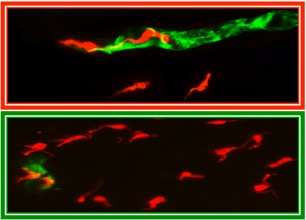African trypanosomiasis is called ‘sleeping sickness’ because when the infection is untreated, trypanosome parasites will invade the brain and cause disruption of sleeping patterns and irreversible neurological damage. A study published on February 25th in PLOS Pathogens reports that in a mouse model of trypanosome disease, nitric oxide (NO) plays an unexpected role in preserving the integrity of the blood brain barrier (BBB), thereby reducing parasite invasion into the brain, and likely limiting neurological damage.
NO is generally thought to be a pro-inflammatory signal, promoting a strong immune response against pathogens. The resulting inflammation is a mixed blessing: on one hand, it helps to control potentially dangerous pathogens, but on the other, it can cause “collateral damage” to the inflamed tissue.
Martin Rottenberg and colleagues, from the Karolinska Institute in Stockholm, Sweden, are interested in how trypanosome parasites cause disease and in the host immune defense against them. In this study, they examine the role of NO in a mouse model of trypanosomiasis, with a focus on how the parasites manage to get through the so-called blood brain barrier (BBB), the border surrounding the mammalian brain that is normally impenetrable to foreign intruders as well as most host cells.
